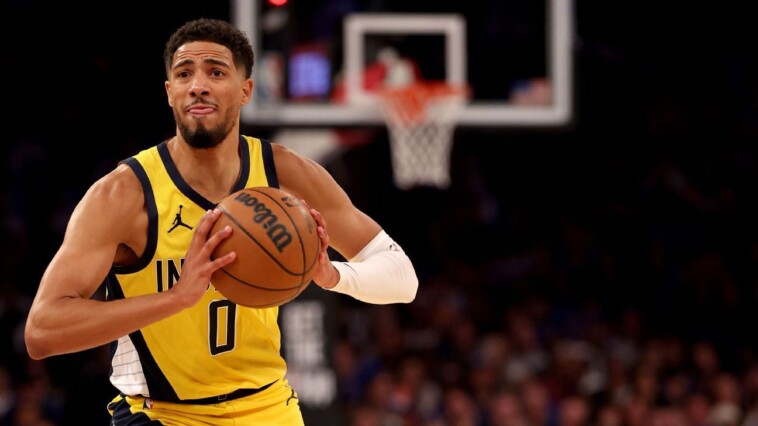-

Andre Snellings, ESPNOct 30, 2024, 12:00 PM ET
What have you done for me lately?
The classic Janet Jackson song applies particularly well to sports, where the memories that matter most are often the recent ones.
Sometimes, it can feel like a recent stretch of games are the new reality, and that players who used to be fantasy hoops stars are never going to produce again. For those players, is it time to panic and take what you can for them in a trade, or should you practice some patience?
Of course, the flip side is also true. When you draft a player you think will be good but they come out the gates on fire — maybe your second-round pick is playing like the best player in basketball, or your mid-round sleeper is suddenly an elite producer, or the guy that wasn’t even drafted is suddenly a top-20 player — is it time to celebrate and ride it out? Or is it better to think about selling high, before these players come back down to earth?
These are the situations and questions we’ll ponder in this space throughout the NBA season.
Panic or Patience?
Tyrese Haliburton, PG, Indiana Pacers
Haliburton was a revelation last season, averaging 24.4 PPG, a league-leading 12.8 APG, to go with 4.2 RPG, 3.5 3PG, 1.0 SPG and 0.7 BPG through his first 31 games before a hamstring injury sidelined him for several weeks and later limited his output for the rest of the season. After having a summer to recover, the expectation was that Haliburton would return to that level this season with a new frontcourt All-Star teammate as a running mate in Pascal Siakam. Instead, through the first week of the season, Haliburton was more afterthought than MVP candidate, with averages of 12.3 PPG, 3.7 APG, 3.3 RPG and 1.7 3PG. He was even held scoreless in one of the games!
So it is time to panic, or time to show some patience?
Verdict: Be patient, but lower expectations. Patience is warranted because Haliburton is too good a player to stay limited for long, as long as he’s healthy. He’s shown signs of breaking out of his funk in his last two games, dropping 22 points on the 76ers on Sunday before following that up with a near triple-double of 19 points, 10 assists and 9 rebounds against the Magic on Monday. He hit four 3-pointers in each game, after going only 1-for-16 from deep in his first two games. He’s starting to find his form.
But, there are reasons to expect Haliburton’s offensive numbers to stay attenuated this season. Two reasons, in particular, are named Andrew Nembhard and Pascal Siakam. Last season, Haliburton played a heliocentric role for the Pacers: the entire offense ran through him. He was the primary ball-handler as well as the primary offense-creator for both himself and teammates, in addition to being a high-volume shooter both off the dribble and the spot-up. It was reminiscent of when Steve Nash went to the Suns a generation ago, and everything ran through him on his way to two MVPs.
The difference for Haliburton this season is that Siakam isn’t just a finisher. He has played point-forward for extended stretches of his career, and is great at creating both his own shot and shots for teammates pass. He is an All-Star frontcourt hub, eating into Haliburton’s usage. Similarly, Nembhard stepped up in Haliburton’s absence last season and proved he could play lead guard at a high level himself, culminating in his averages of 21.0 PPG and 7.8 APG in the Eastern Conference Finals.
With both Siakam and Nembhard in the starting lineup, Haliburton just isn’t asked to carry the same offensive creation load as last season. He’s too good a player not to post All-Star caliber numbers if healthy, but Haliburton leading the league in assists while scoring in the mid-20s per game may not be in the cards this season.
Celebrate or sell high?
Anthony Davis, PF/C, Los Angeles Lakers
Davis is currently playing at a level that would be bar-none the highest in his career if he maintains it. Through four games, he leads the NBA in scoring at 32.8 PPG while also notching 12.0 RPG, 3.3 APG, 2.5 BPG, 1.5 SPG and even 0.5 3PG. He’s making 55% of his shots from the field and more than 80% from the line, and is even turning the ball over less than twice a game. He ranks as the top fantasy producer in the NBA this season, and by a significant margin, according to the ESPN Player Rater.
Davis was a consensus late first-round/early-mid-second round pick this season in fantasy hoops drafts, but is playing like he should’ve gone No. 1 overall. Could this start possibly be an indication of his level this season?
Actually… yes. Yes, it can.
Davis made visible strides last season with his assertiveness and willingness to be the primary scoring option for the Lakers, often even above LeBron James. That confidence, plus the continuity of a career-high 76 games played, led to Davis producing his best fantasy season in a Lakers’ uniform with the fifth-most fantasy points in the NBA. The expectation, if he remained at that level, was that the only thing that might prevent him from being a top-5 fantasy hoops producer again this season is health; Davis has only played more than 66 games in consecutive seasons once in his NBA career.
However, this season’s improvements aren’t related to the health question. Instead, new Lakers coach JJ Redick has built the entire offense around and through Davis. Davis is touching the ball and making decisions almost every trip down the court, and he has clearly been given the green light to aggressively find his shot. The Lakers’ offense is looking for ways to get Davis good looks on a consistent basis, and it’s showing in his 20.0 shots per game thus far.
The thing is, Davis has already proven in his career that he’s capable of carrying that type of shot load. Davis actually averaged 19.9 FGA over a two-season span with the Pelicans during the 2017 and 2018 seasons, putting up 28.1 PPG on 51.9 FG%. But Davis has proven much more efficient as a scorer with the Lakers, making 55.9% from the field in his last two-plus seasons. His scoring aggression is also showing up in his free throw numbers, where he is currently taking 12.8 FTA per game. Davis approaching his career-high in field goal attempts while maintaining his Lakers’ scoring efficiency, with a sprinkle of Redick’s stoking of Davis’ scoring aggression, leads to a Davis capable of challenging for the lead in both scoring and fantasy points this season.
Verdict: Celebrate… very cautiously. I believe Davis can maintain this level, if he stays healthy. That’s a bit ‘if’ in its own right, and can influence a manager’s decision about whether to sell high. But if so, you’d be doing it for that reason, not because his level is an illusion.
Celebrate or sell high?
Zubac has been a solid role-playing center for the Clippers, flirting with a double-double on a nightly basis to average 11.2 PPG (64.2 FG%, 70.8 FT%), 9.6 RPG, 1.2 APG and 1.3 BPG in 27.5 MPG in the two seasons entering this one. He has an ADP of 133.7, meaning he was borderline to be drafted in a standard 10-team, 13-roster spot league.
So why, a week into the season, is he leading the NBA in rebounding (14.0 RPG) and averaging 22.7 PPG? He’s also on pace to shatter his career best with 4.3 APG, currently the third-best mark among true centers, trailing only Nikola Jokic (7.0 APG) and Domantas Sabonis (6.0 APG). Zubac ranks 17th in fantasy scoring thus far, averaging 45.3 FP/game in standard ESPN scoring.
Um. What’s happening?
I’m glad you asked.
Zubac has quietly shown flashes for several seasons, now, that he can step up and produce when called upon. He went for 20 and 12 in the first game of last season, notched a 20-rebound game last December, popped for 22 and 19 against the Lakers in January, and even turned in a 20 and 15 game in the playoffs. The big man has game. What he’s lacked is true first-option playing time and offensive responsibility on a nightly basis. He would have his flashes in one game, then the Clippers would go away from him in subsequent games while other stars like Kawhi Leonard, Paul George and James Harden carried the offensive load.
But George now plays for the 76ers and Leonard is out indefinitely with a knee injury, leaving the Clippers offense bereft of star power. Harden is the engine, but outside of him the team is full of veteran scorer-finisher types that typically operate as role players. The result is, for the first time in his career, there is a vacuum in scoring and offense-creation on Zubac’s team, and they are letting him see if he can fill the void.
And so far, it looks like he can!
Zubac is playing 36.7 MPG this season, dwarfing the 27.5 MPG he’s averaged during the past two seasons, which itself was a big jump from the 20.9 MPG he averaged in his first four seasons with the Clippers. Zubac is in his ninth NBA season, but it’s easy to forget that he entered the league at only 19 years old. He is reaching his peak NBA years at age 27, his game has quietly matured and he seems ready to make a legitimate leap this season.
But even with that said, it is difficult to imagine he would nearly double his best scoring season and improve his best rebounding season by more than 50 percent over the course of a full season. If Zubac maintains his role for the full season, I could see him challenging for 20 and 10+, but I think he slows a bit from 23 and 14 pace. In addition, Leonard is expected to return to the Clippers at some point this season. When he does, he slots back in as the number one scoring option with Harden as the main lieutenant, pushing Zubac’s usage and opportunities back down a couple notches.
Verdict: Celebrate Zubac’s ascension to a player capable of challenging for 20-10 on a nightly basis when called upon. Then, once he has firmly established himself as a fantasy hoops Most Improved Player candidate and his name value has risen in your leagues, I would sell-high before Leonard comes back and retakes the lead role.



